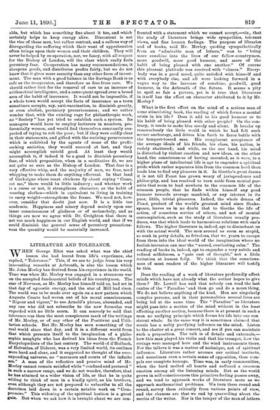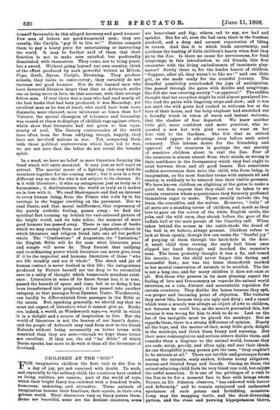LITERATURE AND TOLERANCE.
WHEN George Eliot was asked what was the chief lesson she had learnt from life's experience, she replied, "Tolerance." This, if we are to judge from his very interesting remarks at Arbroath, is also the lesson which Mr. John Morley has derived from his experience in the world. Time was when Mr. Morley was engaged in a strenuous war on the accepted fundamental beliefs of his countrymen. The star of Newman, as Mr. Morley has himself told us, had set in that day of agnostic energy, and the star of Mill had risen. The world was to be made over again on a new pattern which Auguste Comte had woven out of his moral consciousness. "Rigour and vigour," to use Arnold's phrase, abounded, and any one who did not subscribe to the new formulas was regarded with no little scorn. It can scarcely be said that tolerance was then the most conspicuous mark of the writings of Mr. Morley, or of any other of the Positivist and Utili- tarian schools. But Mr. Morley has seen something of the real world since that day, and it is a different world from that which presents itself to the imagination of a philo- sophic neophyte who has derived his ideas from the French Encyclopa3dists of the last century. The world of d'Holbach, of Helvetius, of Diderot, was a very limited world, its outlines were hard and clear, and it suggested no thought of the ever- expanding universe, no "murmurs and scents of the infinite sea." A man of the reflective and pensive mind of Mr. Morley cannot remain satisfied while "confined and pestered" such a narrow range, and we do not wonder, therefore, that he has attained to a wider vision of life, or that he is quite willing to think of men in a kindly spirit, as his brothers, even although they are not prepared to subscribe to all the doctrines laid down in a certain notable work on "Com- promise." This widening of the spiritual horizon is a great gain. But when we ask how it is brought about we are con- fronted with a statement which we cannot accept,—viz., that the study of literature brings wide sympathies, tolerant views, and fine human feelings. The purpose of libraries and of books, said Mr. Morley, quoting sympathetically from an "admirable man of letters," was to "bring more sunshine into the lives of our fellow-countrymen, more goodwill, more good humour, and more of the habit of being pleased with one another." Of course this pleasant platitude was received with "cheers." Every- body was in a good mood, quite satisfied with himself and with everybody else, and all were looking forward in a vague way to the increase of sunshine, goodwill, good humour, in the Arbroath of the future. It seems a pity to spoil so fair a picture, yet is it true that literature in itself has the effect on character attributed to it by Mr. Morley What is the first effect on the mind of a. serious man of some stimulating book, the reading of which forms a mental crisis in his life ? Does it add to his good humour or to. his habit of being pleased with other people? On the con- trary, it tends to make him moody and silent. It breaks up remorselessly the little world in which he had felt such secure anchorage, and drives him forth to fierce battle with the tempest-tossed seas. His complacent acceptance of the average ideals of his friends, his class, his nation, is rudely shattered ; and while, on the one hand, his mind is disturbed by violent emotion and new ideas, on the other hand, the consciousness of having mounted, as it were, to a higher plane of intellectual life is apt to engender a spiritual pride which rather separates him from the common herd than leads him to find any pleasure in it. In Goethe's great drama it is not till Faust has grown weary of jurisprudence and philosophy, and has resolved to turn aside from mental pur- suits that seem to lead nowhere to the common life of the common people, that he finds within himself any good humour towards average mankind, or any interest in its poor, little, trivial pleasures. Indeed, the whole drama of Faust, product of the world's greatest mind since Shake- speare, leaves us in no doubt that to Goethe the life of action, of conscious service of others, and not of mental contemplation, such as the study of literature usually pro- duces, was that which leads to harmonious relations with one's fellows. The higher literature is, indeed, apt to disenchant us
with the actual world. The men around us seem so stupid, so sunk in petty details, so frivolous, that we yearn to escape from them into the ideal world of the imagination where no foolish intrusion can mar the "sacred, everlasting calm." The reading of books is, indeed, apt to engender a very subtle and refined selfishness, a "pale cast of thought," not a little irritation at human folly. We think that the conscious- ness of most readers of the higher literature will testify to this.
Does the reading of a work of literature profoundly affect minds which have not already what the author hopes to give them ? Mr. Lowell has said that nobody can read the last cantos of the " Paradiso " and then go and do a mean thing. We do not believe anything of the kind. Men are singularly complex persons, and in their personalities several lives are being led at the same time. The " Paradiso " as literature might pass into a section of the mind without in the least affecting another section, because there is at present in such a man no unifying principle which forms his life into one con sistent whole. In the same way it is sometimes claimed that music has a nobly purifying influence on the mind. Listen to the chatter at a great concert, and see if you can maintain such a proposition. The talk is of details and externals,— how this man played his violin and that his trumpet, how the strings were managed here and the wind instruments there. Forthe talkers it was a matter of technique, not of spiritual influence. Literature rather arouses our critical instincts„ and sometimes even a certain sense of opposition, than com- pels our complete homage. Time was, in early communities,. when the bard melted all hearts and suffused a common emotion among all the listening minds. But as the world grows in self-consciousness this primitive feeling passes away, and we tend to approach works of literature more as we approach mathematical problems. We turn them round and round, survey them critically from various points of view, and the chances are that we end by quarrelling about the merits of the writer. Nor is the temper of the man of letters himself favourable to this alleged harmony and good humour. Few men of letters are good-humoured men; they are usually, like Carlyle, " gey ill to live wi'." Nature compels them to pay a heavy price for entertaining or instructing the world. It may be farther said of them that their function is not to make men satisfied, but profoundly dissatisfied, with themselves. They come, not to bring peace, but a sword. Without going beyond our own country, think of the effect produced by such powerful writers as Milton, Pope, Swift, Byron, Carlyle, Browning. They produce schools, they incite to controversy; they certainly do not increase our good humour. Nor do the learned men who have devoured libraries larger than that at Arbroath strike one as being more in love, on that account, with their average fellow-men. If ever there was a man who had read nearly all the beat books that had been produced, it was Macaulay; yet excellent man as he was at heart, who could have been more dogmatic, more clamant, more intolerant at times than he ? Voltaire, the special champion of tolerance and humanity, was roused at times to displays of childish rage against others, which show that literature had not given to him equa- nimity of soul. The literary controversies of the world have often been far from edifying, though, happily, they have not involved nations in war. Yet, comparing them with those political controversies which have led to war, we are not sure that the latter do not reveal the broader spirit.
In a word, we have no belief in mere literature forming the bond which will unite mankind. It may just as well repel as attract. The martial music of a fighting clan may knit its members together for the coming onset ; but it acts in a very different way on the foe who is not subject to its charms. So is it with literature ; it stirs up antagonism just as truly as it harmonises ; it disillusionisea the world as truly as it makes cs in love with it. We read Shakespeare and find an interest in every human being, from the Prince who rolls by in his carriage to the beggar crawling on the pavement. But we read Dante, and that moral indifference, that supremacy of the purely cesthetic feeling, passes away ; we find the spiritual fact looming up behind the van-coloured picture of the bright world, and we take sides; the moment of mere good humour has passed away. There is one class of books which we may exempt from our general judgment,—those in which literature and religion blend into one all but perfect -whole. The " Confessions " of Augustine, the "Imitation," the English Bible will do for men what literature pure and simple will never do. They furnish that unifying and co-ordinating power which literature can never give, even if it be the impartial and humane literature of those "who see life steadily and see it whole." The shock and jar of human contact is never hushed in this life; the antagonisms produced by Nature herself are too deep to be reconciled save in a unity of thought which transcends mundane exist- ence. Literature in some of its finest forms has, it is true, passed the bounds of space and time, but in so doing it has been transformed into prophecy ; it has passed into another category, so that passages from Spenser, Dante, Wordsworth, can hardly be differentiated from passages in the Bible or the saints. But, speaking generally, we should say that we .must not expect of literature what it cannot give us. Books . are, indeed, a world, as Wordsworth says,—a world in which it is a delight and a source of inspiration to live. But the world of literature is not the heaven of our heart's desire; and the people of Arbroath may read from now to the Greek ICalends without being necessarily on better terms with mankind than they are now,—though we hope these terms are excellent. If they are, the old "ha' Bible" of which Burns speaks, has more to do with it than all the literature of Scotland.







































 Previous page
Previous page